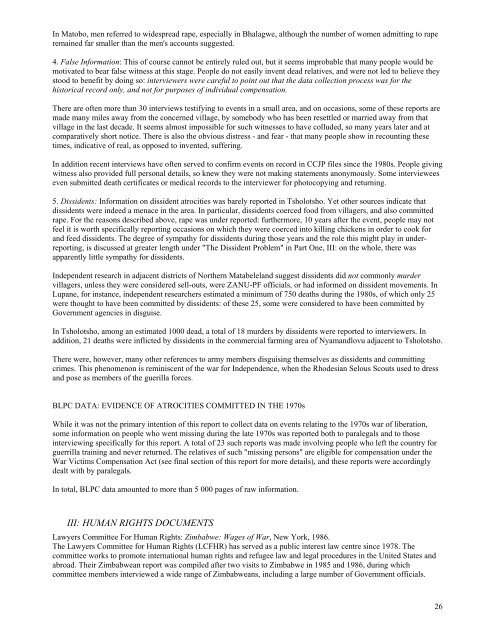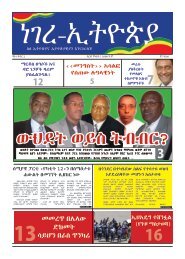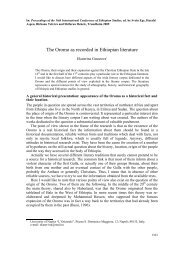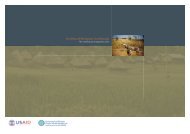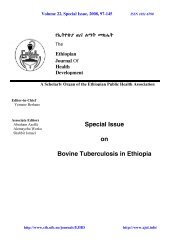MatabelelandReport
MatabelelandReport
MatabelelandReport
You also want an ePaper? Increase the reach of your titles
YUMPU automatically turns print PDFs into web optimized ePapers that Google loves.
In Matobo, men referred to widespread rape, especially in Bhalagwe, although the number of women admitting to rape<br />
remained far smaller than the men's accounts suggested.<br />
4. False Information: This of course cannot be entirely ruled out, but it seems improbable that many people would be<br />
motivated to bear false witness at this stage. People do not easily invent dead relatives, and were not led to believe they<br />
stood to benefit by doing so: interviewers were careful to point out that the data collection process was for the<br />
historical record only, and not for purposes of individual compensation.<br />
There are often more than 30 interviews testifying to events in a small area, and on occasions, some of these reports are<br />
made many miles away from the concerned village, by somebody who has been resettled or married away from that<br />
village in the last decade. It seems almost impossible for such witnesses to have colluded, so many years later and at<br />
comparatively short notice. There is also the obvious distress - and fear - that many people show in recounting these<br />
times, indicative of real, as opposed to invented, suffering.<br />
In addition recent interviews have often served to confirm events on record in CCJP files since the 1980s. People giving<br />
witness also provided full personal details, so knew they were not making statements anonymously. Some interviewees<br />
even submitted death certificates or medical records to the interviewer for photocopying and returning.<br />
5. Dissidents: Information on dissident atrocities was barely reported in Tsholotsho. Yet other sources indicate that<br />
dissidents were indeed a menace in the area. In particular, dissidents coerced food from villagers, and also committed<br />
rape. For the reasons described above, rape was under reported: furthermore, 10 years after the event, people may not<br />
feel it is worth specifically reporting occasions on which they were coerced into killing chickens in order to cook for<br />
and feed dissidents. The degree of sympathy for dissidents during those years and the role this might play in underreporting,<br />
is discussed at greater length under "The Dissident Problem" in Part One, III: on the whole, there was<br />
apparently little sympathy for dissidents.<br />
Independent research in adjacent districts of Northern Matabeleland suggest dissidents did not commonly murder<br />
villagers, unless they were considered sell-outs, were ZANU-PF officials, or had informed on dissident movements. In<br />
Lupane, for instance, independent researchers estimated a minimum of 750 deaths during the 1980s, of which only 25<br />
were thought to have been committed by dissidents: of these 25, some were considered to have been committed by<br />
Government agencies in disguise.<br />
In Tsholotsho, among an estimated 1000 dead, a total of 18 murders by dissidents were reported to interviewers. In<br />
addition, 21 deaths were inflicted by dissidents in the commercial farming area of Nyamandlovu adjacent to Tsholotsho.<br />
There were, however, many other references to army members disguising themselves as dissidents and committing<br />
crimes. This phenomenon is reminiscent of the war for Independence, when the Rhodesian Selous Scouts used to dress<br />
and pose as members of the guerilla forces.<br />
BLPC DATA: EVIDENCE OF ATROCITIES COMMITTED IN THE 1970s<br />
While it was not the primary intention of this report to collect data on events relating to the 1970s war of liberation,<br />
some information on people who went missing during the late 1970s was reported both to paralegals and to those<br />
interviewing specifically for this report. A total of 23 such reports was made involving people who left the country for<br />
guerrilla training and never returned. The relatives of such "missing persons" are eligible for compensation under the<br />
War Victims Compensation Act (see final section of this report for more details), and these reports were accordingly<br />
dealt with by paralegals.<br />
In total, BLPC data amounted to more than 5 000 pages of raw information.<br />
III: HUMAN RIGHTS DOCUMENTS<br />
Lawyers Committee For Human Rights: Zimbabwe: Wages of War, New York, 1986.<br />
The Lawyers Committee for Human Rights (LCFHR) has served as a public interest law centre since 1978. The<br />
committee works to promote international human rights and refugee law and legal procedures in the United States and<br />
abroad. Their Zimbabwean report was compiled after two visits to Zimbabwe in 1985 and 1986, during which<br />
committee members interviewed a wide range of Zimbabweans, including a large number of Government officials.<br />
26


